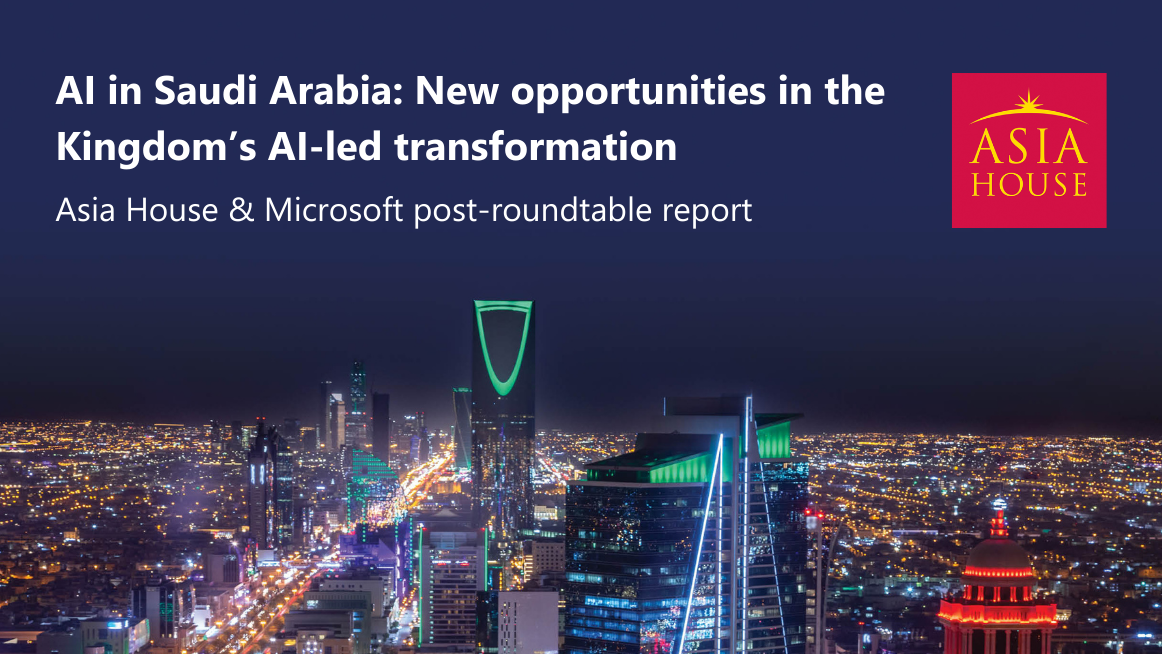Asia House & Microsoft post-roundtable report

Artificial Intelligence (AI) presents transformative opportunities for economic development, society, innovation and efficiencies across an array of sectors and industries in Saudi Arabia – and indeed globally. As the world seeks to understand the transformative potential of AI, Saudi Arabia is strategically positioning this technology as an instrumental tool in delivering its Vision 2030 strategy. With AI at the forefront of its economic and digital transformation, Saudi Arabia seeks to not only utilise AI to catalyse sustainable, technology-driven growth but also to play a leadership role in the sector. As Saudi Arabia’s government, educational institutions and commercial entities all devote a greater focus to AI, it becomes increasingly essential to discuss the benefits and implications of this technology.
Against the backdrop of rapid change within the Kingdom and the government’s specific focus on AI, Asia House together with Microsoft organised a roundtable on the issue in Riyadh in April 2024. This report summarises some of the key themes and insights generated from the discussion. This report has also been informed by separate on-the-record interviews with leading AI experts and practitioners based in the Kingdom.
DOWNLOAD THE REPORT
Key takeaways:
- AI should continue to be leveraged as it presents transformative opportunities across sectors and industries in the Kingdom, in line with Vision 2030. AI’s potential and existing applications include in cognitive cities, the banking sector, Arabic LLMs and Hajj and Umrah.
- Saudi Arabia has established a national strategy and strong institutions, namely SDAIA, which have been fundamental in advancing the Kingdom’s AI agenda. Saudi Arabia’s strategy and significant government bodies also demonstrate its commitment to fostering an AI-friendly ecosystem.
- The Kingdom is attempting to balance risk and regulation with innovation, which will contribute to its successful leveraging of AI. This includes through the AI Ethics Principles framework and the PDPL that are meaningfully changing the regulatory landscape of the Kingdom. However, achieving this balance is complex and there is no single way to regulate AI. Indeed, this remains a global challenge with countries opting for different approaches. In addition, establishing interoperable mechanisms to enable the free flow of data globally remains a challenge but would benefit AI.
- In order for Saudi Arabia to demonstrate regional and global leadership in AI, it should continue devoting sustained focus to encouraging investment and entrepreneurship and fostering R&D and innovation. AI should also be developed and integrated alongside other technologies, such as quantum, the Internet of Things, semiconductors, robotics and automation.
- Further accelerating an upskilling of local talent will continue to be necessary. The Kingdom’s educational system is reforming gradually and remains critical to addressing current gaps in AI talent. The Kingdom’s universities in particular are a key enabler of AI’s development and application and meeting the challenge of supplying local AI talent.
- Given the inherently global nature of AI, further collaborations with the international community can help the Kingdom achieve its leadership goals. This may necessitate a degree of flexibility and preparedness to adapt and amend its strategies and regulations in response to changes in this fast-evolving technology.
VIEW FULL REPORT
Asia House works with governments across Asia, the Middle East and the West, as well as multilateral organisations and the private sector, to drive commercial and political engagement around key issues in global trade. For more information on our research and programmes, please contact Katie Reid, Stakeholder Engagement Associate via katie.reid@asiahouse.co.uk.

